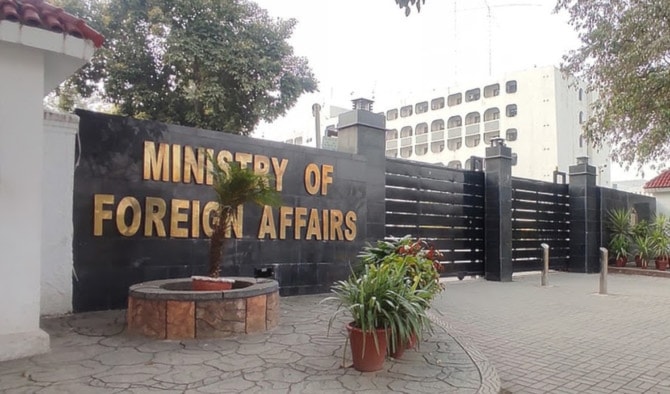Pakistan escalates diplomatic measures against Iran after IRGC strikes
The Jaish ul-Adl designated terrorist group by Iran admits that Iranian ballistic missiles and drones hit their positions in Pakistan's Balochistan.
-

Gates of Pakistan's Foreign Ministry building in Islamabad, Pakistan (Social media)
Pakistan declared on Wednesday suspending all high-level visits scheduled with Iran in the coming days, recalled its ambassador to Tehran, and announced that the Iranian envoy to Islamabad, who is currently visiting his country, "may not return for the time being."
On Monday evening, the Iranian Revolution Guards Corps IRGC announced carrying out multiple strikes, using ballistic missiles and drones, on terrorist targets in Syria, Mossad headquarters in Iraqi Kurdistan's Erbil.
Then, in a later statement on Tuesday, it revealed another strike on strongholds belonging to Jaish ul-Adl in Pakistan, a group designated as "terrorist" by Iran.
According to Iranian media, the operation came after long years of communicating with several regional governments regarding terrorist attacks targeting Iran that were originating from their countries, including Iraq.
In a statement, Pakistan's Foreign Ministry described Iran's strikes as an "unprovoked and blatant breach of Pakistan’s sovereignty" and in "violation of international law and the "principles" of the UN Charter.
"Pakistan reserves the right to respond to this illegal act. The responsibility for the consequences will lie squarely with Iran," the statement read.
The Pakistani government has earlier condemned the Iranian targeting of sites in the country, describing them as an "unprovoked violation of its airspace."
The government added that the attack "resulted in the death of two innocent children while injuring three girls" and summoned Iran's chargé d'affaires to Islamabad to protest the strikes.
However, Jaish ul-Adl admitted in a statement on Tuesday that their positions were hit in the long-range strikes carried out by the IRGC late Monday, MEHR reported.
In a statement, Jaish ul-Adl said that at least 6 suicide drones and several missiles hit the militants' sites in the border mountains of Pakistan's Balochistan.
Double terrorist explosions
The Jaish ul-Adl "terror group" has conducted several bomb attacks and kidnappings in southeastern Iran over the past years, targeting both civilians and security forces, with the aim of disrupting the country’s security and stability, Iranian media explained.
On January 3, a double terrorist explosion targeted a crowd consisting of thousands of civilians who were marching toward the gravesite where former IRGC's al-Quds Force commander General Qassem Soleimani was laid to rest, resulting in the martyrdom of around 100 civilians and the wounding of dozens.
Read more: International condemnation of bombing in Kerman, Iran
The Iranian nation was commemorating the 4th anniversary of his martyrdom after he was assassinated by the United States along with PMF leader Abu Mahdi al-Muhandes. General Soleimani was on an official visit to Iraq then.
Commander-in-Chief of the Islamic Revolution Guard Corps (IRGC) in Iran, Major General Hossein Salami, emphasized then that his country would avenge its martyrs.
"We are in amid a major battle, and we will defeat the takfiris every day. We will not allow the enemy to control us, and we will achieve further victories," he said.
Operations in response to terror attacks
Meanwhile, the IRGC announced that the operations are in response to "the terrorist crimes recently committed by Iran’s enemies," the assassination of Iranian military chiefs in Syria and Resistance leaders, and the killing of innocent civilians in Kerman.
The attack on Syria targeted the headquarters of terrorist leaders and members linked to the recent terrorist attacks in Iran, mainly ISIS terrorist cells, the IRGC said, which was later confirmed by the targeted groups.
Meanwhile, the Mossad HQ is the base for developing espionage operations and planning terrorist operations in the region, especially against Iran," the Iranian Revolution Guards Corps said.

 4 Min Read
4 Min Read










